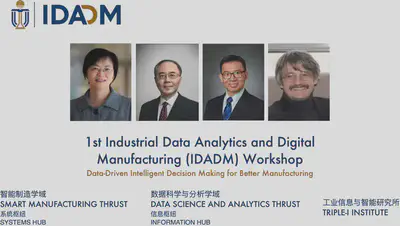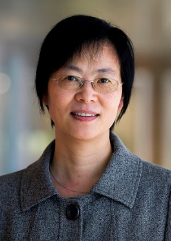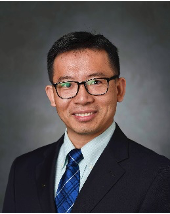1st Industrial Data Analytics and Digital Manufacturing (IDADM) Workshop
Abstract
The 1st Industrial Data Analytics and Digital Manufacturing (IDADM) Workshop brings together leading researchers and industry experts to explore data-driven intelligent decision-making for improving manufacturing. Keynotes, reports, and discussions will highlight advanced techniques in additive manufacturing, digital twins, and sustainable manufacturing.
Table of Contents

Agenda
Date: December 20-22, 2024
Theme: Data-Driven Intelligent Decision Making for Better Manufacturing
December 20th, Friday
| Time | Content |
|---|---|
| Evening | Registration |
December 21st, Saturday
| Time | Content | Remarks |
|---|---|---|
| 9:00-9:30 | Opening Remarks | Chair: Prof. Fugee Tsung, Chair Professor at HKUST (GZ), Director of Triple-i |
| Prof. Ricky Lee, Dean of Systems Hub at HKUST (GZ) | ||
| Prof. Lei Chen, Dean of Information Hub at HKUST (GZ) | ||
| Prof. Kai Tang, Head of Smart Manufacturing Thrust at HKUST (GZ) | ||
| 9:30-9:40 | Group photo session | |
| 9:40-10:10 | Keynote Speech I | |
| Speaker: Prof. Judy Jin, Professor at the University of Michigan | ||
| Title: Machine Learning to Empower In-Situ Quality Control for Smart Manufacturing | ||
| 10:10-10:40 | Keynote Speech II | |
| Speaker: Prof. Jingshan Li, Full Professor at Tsinghua University | ||
| Title: Sustainable Manufacturing Systems: Smart Planning and Operation for Green Manufacturing | ||
| 10:40-11:00 | Coffee/Tea Break | |
| 11:00-11:30 | Keynote Speech III | Chair: Prof. Fugee Tsung, Chair Professor at HKUST (GZ), Director of Triple-i |
| Speaker: Prof. Hui Yang, Professor at Penn State | ||
| Title: Sensor-based Modeling and Optimization of Additive Manufacturing | ||
| 11:30-12:00 | Keynote Speech IV | |
| Speaker: Prof. Andrea Matta (online), Full Professor at Politecnico di Milano | ||
| Title: Data-driven Approaches Towards Autonomous Digital Twins | ||
| 12:00-14:00 | Lunch | |
| 14:00-15:10 | IDADM Report I | Chair: Prof. Juan Du, Assistant Professor at HKUST (GZ), Associate Director of Industrial Intelligence and Data Analytics Lab |
| Speaker 1: Prof. Juan Du, Assistant Professor at HKUST (GZ) | ||
| Title: Introduction and Recent Advances of IDADM Lab | ||
| Speaker 2: Peng Ye, MPhil student in Smart Manufacturing Thrust, HKUST (GZ) | ||
| Title: Sequential Actuator Placement Selection and Optimization for Aircraft Fuselage Assembly via Reinforcement Learning | ||
| Speaker 3: Xuanming Cao, PhD student in Smart Manufacturing Thrust, HKUST (GZ) | ||
| Title: Deep Subspace Learning for Surface Anomaly Classification Based on 3D Point Cloud Data | ||
| 15:10-15:30 | Break | |
| 15:30-16:30 | IDADM Report II | Chair: Prof. Juan Du, Assistant Professor at HKUST (GZ), Associate Director of Industrial Intelligence and Data Analytics Lab |
| Speaker 1: Letian Bai, PhD student in Smart Manufacturing Thrust, HKUST (GZ) | ||
| Title: Key Variable Identification and Quality Prediction in Nonlinear Multistage Manufacturing Processes of Ceramic Firing Process | ||
| Speaker 2: Mingze Gong, PhD student in Smart Manufacturing Thrust, HKUST (GZ) | ||
| Title: Gradual Degradation Modeling in UAV Systems for Anomaly Detection | ||
| Speaker 3: Jiaping Cao, PhD student in Smart Manufacturing Thrust, HKUST (GZ) | ||
| Title: FIT3D: Real-time Flatness Inspection Algorithm for Ceramic Tiles using the Structured Light 3D Scanner | ||
| 16:30-16:40 | Closing Remark | |
| Speaker: Prof. Kai Tang Prof. Fugee Tsung |
December 22nd, Sunday
| Time | Content |
|---|---|
| Morning | Campus and Lab Visit |
Keynote Abstracts
Keynote Speech I: Machine Learning to Empower In-Situ Quality Control for Smart Manufacturing

Speaker: Prof. Jionghua Judy Jin, A. Galip Ulsoy Collegiate Professor of Engineering at the University of Michigan
Introduction:
Dr. Jionghua Judy Jin is the A. Galip Ulsoy Collegiate Professor of Engineering and a professor in the Department of Industrial and Operations Engineering at the University of Michigan. Her research focuses on the intersection of data science and quality engineering, emphasizing the integration of process design and operational data to enhance quality control decision-making.
Her research has been widely implemented in various industrial production systems and has received numerous awards, including:
- 17 Best Paper Awards
- Forging Achievement Award
- NSF CAREER Award
- NSF PECASE Award
Dr. Jin currently serves as the Focus Issue Editor for IISE Transactions on Data Science, Quality, and Reliability and is the Editor-in-Chief elect of IISE Transactions.
Abstract:
The convergence of advanced sensor technologies and the Internet of Things has created unprecedented opportunities for smart manufacturing. However, the abundance of data also presents significant challenges, particularly in analyzing massive, high-dimensional streaming data characterized by spatial and temporal heterogeneity with complex functional dependencies.
This talk will explore how the rapid evolution of machine learning techniques can address these challenges to enhance in-situ quality control decision-making for smart manufacturing. The presentation will include:
- Opportunities and challenges in quality engineering for smart manufacturing
- Examples demonstrating the critical role of machine learning in handling complexities of online sensing data for automatic defect detection and enabling continuous learning for in-situ quality control
Keynote Speech II: Sustainable Manufacturing Systems: Smart Planning and Operation for Green Manufacturing

Speaker: Prof. Jingshan Li, Full Professor at Tsinghua University
Introduction:
Dr. Jingshan Li is a full professor in the Department of Industrial Engineering, Tsinghua University. He is an IEEE Fellow, an IISE Fellow, and an IEEE Distinguished Lecturer in Robotics and Automation. Prior to joining Tsinghua University, he was a tenured professor in the Department of Industrial and Systems Engineering at the University of Wisconsin-Madison, where he worked until September 2021.
Dr. Li’s main research areas are in modeling, analysis, and control in manufacturing and healthcare systems. His innovative contributions are widely recognized, with numerous peer-reviewed journal articles, conference proceedings, two textbooks, and seven edited book volumes.
Dr. Li has received many prestigious awards, including:
- NSF CAREER Award
- IEEE Early Career Award in Robotics and Automation
- Best Paper Awards from IEEE Transactions, IIE Transactions, and prestigious international conferences
- Best Textbook Award
- Multiple awards from UW Madison
He has served as a Senior Editor for several top journals and chaired flagship conferences in his field.
Abstract: In order to respond to climate change, carbon peak and carbon neutrality have become strategic goals worldwide. Manufacturing ranks third in both energy consumption and greenhouse gas emissions, and first in toxic releases. Therefore, manufacturing must prioritize sustainability and transition to green practices. Sustainable manufacturing systems are critically important to the global economy, supply chains, and societal benefits. These systems typically encompass two key areas: 1. Manufacturing systems that produce green technology or renewable energy products. 2. Scheduling, control, and optimization of manufacturing processes to reduce energy consumption and emissions. This talk will review recent progress in sustainable manufacturing systems, focusing on the analysis, design, and optimization of these systems. Through examples in battery manufacturing, energy-intensive production, and system redesign, we will introduce smart planning and scheduling methods to reorganize processes and operations, achieving energy-efficient and environmentally friendly manufacturing.
Keynote Speech III: Sensor-based Modeling and Optimization of Additive Manufacturing

Speaker: Prof. Hui Yang, Professor at Penn State
Introduction:
Dr. Hui Yang is a Fellow of IISE and a Professor of Industrial and Manufacturing Engineering and Biomedical Engineering at Penn State. He is affiliated with the Penn State Cancer Institute (PSCI), Clinical and Translational Science Institute (CTSI), Institute for Computational and Data Sciences (ICDS), and CIMP-3D.
Dr. Yang serves as the Director of the NSF Center for Health Organization Transformation (CHOT). Before joining Penn State in 2015, he was an Assistant Professor in the Department of Industrial and Management Systems Engineering at the University of South Florida from 2009 to 2015.
Dr. Yang has held leadership roles, such as:
- President of IISE Data Analytics and Information Systems Society (2017-2018)
- President of INFORMS Quality, Statistics, and Reliability (QSR) Society (2015-2016)
- Program Chair of the 2016 IISE Annual Conference
He is the Editor-in-Chief for IISE Transactions on Healthcare Systems Engineering and an Associate Editor for numerous top-tier journals, including IISE Transactions, IEEE Journal of Biomedical and Health Informatics (JBHI), ASME Journal of Computing and Information Science in Engineering (JCISE), IEEE Transactions on Automation Science and Engineering (TASE), IEEE Robotics and Automation Letters (RA-L), and others.
Abstract:
Additive Manufacturing (AM) provides a greater level of flexibility to produce 3D parts with complex geometries directly from designs. However, widespread application of AM is hampered by technical challenges in process repeatability and quality control.
This talk presents a new sequential decision-making framework for in-situ control of AM processes using the Constrained Markov Decision Process (CMDP). The CMDP framework jointly considers the conflicting objectives of total cost (e.g., energy or time) and build quality.
The talk will focus on:
- Advanced sensing for real-time monitoring of AM processes
- Analytical methods for feature extraction sensitive to layerwise defects
- Sequential decision-making approaches for in-situ corrective actions during AM builds
Experimental results demonstrate how the CMDP formulation provides effective policies for executing corrective actions to repair and counteract incipient defects in AM before the build is completed.
Keynote Speech IV: Data-driven Approaches Towards Autonomous Digital Twins

Speaker: Prof. Andrea Matta, Full Professor at Politecnico di Milano
Introduction:
Dr. Andrea Matta is a Full Professor of Manufacturing and Production Systems at the Department of Mechanical Engineering, Politecnico di Milano. He also serves as a Guest Professor at Shanghai Jiao Tong University. Since graduating in Industrial Engineering from Politecnico di Milano, Dr. Matta has been actively involved in teaching and research there since 1998.
Dr. Matta has held various distinguished positions, including:
- Distinguished Professor at the School of Mechanical Engineering, Shanghai Jiao Tong University (2014-2016)
- Visiting Professor at Ecole Centrale Paris (France), University of California at Berkeley (USA), and Tongji University (China)
Dr. Matta is currently the scientific lead for the Research Area Design and Management of Manufacturing Systems at MUSP (Laboratory for Machine Tools and Production Systems). His expertise spans analysis, design, and management of manufacturing and healthcare systems.
Dr. Matta has published more than 130 scientific papers in international journals and conference proceedings. He is the Editor-in-Chief of the Flexible Services and Manufacturing Journal and serves on the editorial boards of the OR Spectrum journal and IEEE Robotics and Automation Letters.
His awards and recognitions include:
- Shanghai One Thousand Talent
- Eastern Scholar Award (2013)
- Recognition as a leading scholar in production research by the International Journal of Production Research
Title:
Data-driven Approaches Towards Autonomous Digital Twins
Abstract:
With the emergence of Industry 4.0, digital representations of production systems—commonly referred to as digital twins—have transitioned from being peripheral tools to becoming central to manufacturing operations. Unlike traditional simulation models used for offline what-if analysis, digital twins are developed as self-adaptable and empowered decision-makers that remain dynamically aligned with the real system.
These new capabilities have established digital twins as key enablers for implementing the smart manufacturing paradigm. However, significant challenges remain in adopting digital twins within industrial applications. Key barriers include:
- The high skill requirements for creating and updating digital twin models.
- Long development times and limited integration with optimization and AI packages.
- Frequent changes in manufacturing systems during their lifecycle, which exacerbate these issues.
This presentation will describe data-driven approaches for generating, synchronizing, and validating multi-perspective models for digital twins of discrete event systems using sensor data.
Additional Information
Triple-i Institute
The Triple-i Institute is dedicated to establishing a new scientific foundation for the design, analysis, and control of complex manufacturing and service systems. It bridges the gap between data analytics, engineering systems, and industrial practice by integrating systems and information with data-driven, model-driven, and problem-driven methodologies.
Key research areas include:
- Industrial carbon neutrality
- Industrial intelligence
- Industrial IoT
The institute also emphasizes industrial engagement, education, and training in industrial informatics.
IDADM Lab
The IDADM Lab, directed by Dr. Juan Du, aims to revolutionize the manufacturing industry by leveraging data analytics, machine learning, and artificial intelligence to achieve:
- Significant quality and productivity improvements
- Cost reductions
- Energy conservation
The lab addresses challenges in continuous and discrete manufacturing sectors, including:
- Ceramics manufacturing
- Semiconductor manufacturing
- Solar cell manufacturing
- Pipe tightening process
- Composite fuselage assembly
- Ship assembly
More information: IDADM Lab Website
Smart Manufacturing Thrust
The Smart Manufacturing Thrust focuses on adaptive and agile computer-integrated manufacturing technologies, leveraging digital analysis and intelligent technologies to develop more flexible and efficient manufacturing processes.
Key research areas include:
- Micro-nano manufacturing
- Multi-scale dynamic modeling and simulation
- Additive and hybrid manufacturing
- Precision multi-axis and robotic processing
- Intelligent sensing and industrial big data analysis
Data Science and Analytics (DSA) Thrust
The DSA Thrust is dedicated to fostering a dynamic learning environment that equips students with the knowledge, skills, and ethical values required to excel in the rapidly evolving field of data science.
The thrust promotes:
- Interdisciplinary collaboration
- Cutting-edge research
- Data-driven decision-making
Through academic programs, research initiatives, and meaningful partnerships with industry and community stakeholders, the DSA Thrust aims to shape the future of data science and analytics and drive innovation across diverse domains.
Transportation & Accommodation Guide
Transportation Guide
1. Guangzhou Baiyun International Airport
Option 1 - Metro Route:
- Distance: 90km
- Take Metro Line 3 (North Extension) to Tiyu Xilu Station
- Transfer to Line 3 to Kecun Station
- Transfer to Line 8 to Wanshengwei Station
- Transfer to Line 4 to Jiaomen Station
- Walking: About 15 minutes (400m south along Phoenix Avenue, then 500m west)
- Total journey time: ~1 hour 50 minutes
Option 2 - Alternative Metro Route:
- Take Metro Line 3 (North Extension) to Tiyu Xilu Station
- Transfer to Line 3 to Zhujiang New Town Station
- Transfer to Line 5 to Chebeinan Station
- Transfer to Line 4 to Jiaomen Station
- Walking: Same as Option 1
- Total journey time: ~1 hour 50 minutes
Option 3 - Taxi:
- Distance: 90km
- Cost: ~350 RMB (including ~40 RMB toll fee)
2. Shenzhen Bao’an International Airport
Option 1 - Metro + High-Speed Rail:
- Distance: 63km
- Take Shenzhen Metro Line 11 to Qianhai Bay
- Transfer to Line 5 to Shenzhen North Station
- Take high-speed rail to Qingsheng Station
- Train times from Shenzhen North: 8:00, 11:46, 12:07, 13:09, 13:14, 13:56, 15:20, 15:43, 17:34, 18:38
- Duration: 21 minutes
- Ticket price: 49.5 RMB
- Take Metro Line 4 to Jiaomen Station (12 minutes)
- Walking: 15 minutes
Option 2 - Taxi:
- Cost: ~260 RMB (including ~60 RMB toll fee)
3. Guangzhou South Railway Station
Option 1 - Metro + Bus:
- Distance: 42km
- Take Metro Line 22 to Panyu Square Station
- Transfer to Line 18 to Hengli Station (~30 minutes)
- From Gate D, walk to Hengli Bus Station
- Take Nansha G1 Bus to Jiaomen Village Arch Station
- Walking: About 5 minutes (100m south along Fengze West Road, then 100m east)
Option 2 - Metro Route:
- Take Metro Line 7 to Higher Education Mega Center South Station
- Transfer to Line 4 to Jiaomen Station
- Total journey time: ~1 hour 5 minutes
- Walking: About 15 minutes (400m south along Phoenix Avenue, then 500m west)
Option 3 - Taxi:
- Distance: 42km
- Cost: ~130 RMB (including ~15 RMB toll fee)
4. Qingsheng Station
Option 1 - Metro:
- Distance: 4.7km
- Take Metro Line 4 (towards Nansha Passenger Port) 6 minutes to Jiaomen Station
Option 2 - Taxi:
- Distance: 4.7km
- Cost: ~10 RMB
Campus Dining
Xinlianxin Restaurant
- Location: 1st floor, Building C6
Double Tree Hong Kong Restaurant
- Location: 2nd floor, Building C6
Starbucks
- Location: Ground floor, east side of Building C1
KFC
- Location: Ground floor, Building 2A
Sum Look Café
- Location: 2nd floor middle hall, Building E2
Yiwan Guifen
- Location: Ground floor, South District Apartment 2A
Real Kung Fu
- Location: 1st floor, Core Campus Building 5C
Note: For campus navigation, please use the WeChat Mini Program “科大GO”.
交通&食宿指南
交通指南
1. 广州白云机场
路线一 - 地铁路线:
- 距离:90公里
- 乘地铁3号线(北延段)至体育西路
- 换乘地铁3号线至客村地铁站
- 换乘地铁8号线至万胜围地铁站
- 换乘地铁4号线至蕉门地铁站
- 步行:沿凤凰大道向南约400米,向西约500米,约15分��
- 总行程时间:约1小时50分钟
路线二 - 地铁替代路线:
- 乘地铁3号线(北延段)至体育西路
- 换乘地铁3号线至珠江新城地铁站
- 换乘地铁5号线至车陂南地铁站
- 换乘地铁4号线至蕉门地铁站
- 步行:同路线一
- 总行程时间:约1小时50分钟
路线三 - 出租车:
- 距离:90公里
- 费用:约350元(含约40元高速费)
2. 深圳宝安机场
路线一 - 地铁+高铁:
- 距离:63公里
- 乘坐深圳地铁11号线至前海湾
- 换乘深圳地铁5号线至深圳北地铁站
- 乘坐高铁至庆盛高铁站
- 深圳北发车时间:8:00、11:46、12:07、13:09、13:14、13:56、15:20、15:43、17:34、18:38
- 行程时间:21分钟
- 票价:49.5元
- 乘坐地铁4号线至蕉门地铁站(约12分钟)
- 步行:15分钟
路线二 - 出租车:
- 费用:约260元(含约60元高速费)
3. 广州南站
路线一 - 地铁+公交:
- 距离:42公里
- 乘地铁22号线至番禺广场地铁站
- 换乘地铁18号线至横沥地铁站(约30分钟)
- 从D口出站步行至横沥站公交站
- 乘坐南沙G1路至蕉门村牌坊站
- 步行:沿丰泽西路向南约100米,向东约100米,约5分钟
路线二 - 地铁路线:
- 乘地铁7号线至大学城南地铁站
- 换乘地铁4号线至蕉门地铁站
- 总行程时间:约1小时5分钟
- 步行:沿凤凰大道向南约400米,向西约500米,约15分钟
路线三 - 出租车:
- 距离:42公里
- 费用:约130元(含约15元高速费)
4. 庆盛站
路线一 - 地铁:
- 距离:4.7公里
- 乘地铁4号线(南沙客运港方向)6分钟直达蕉门站
路线二 - 出租车:
- 距离:4.7公里
- 费用:约10元
校内餐厅
心连心餐厅
- 位置:校内C6栋一楼
逸林港式茶餐厅
- 位置:校内C6栋二楼
星巴克
- 位置:校内C1栋东侧首层
肯德基
- 位置:校内2A栋首层
森绿餐吧
- 位置:校内E2栋二楼中厅
一碗贵粉
- 位置:校内南区公寓2A首层
真功夫
- 位置:核心校区5C一楼
注: 校内可使用微信小程序"科大GO"获得校内导航。